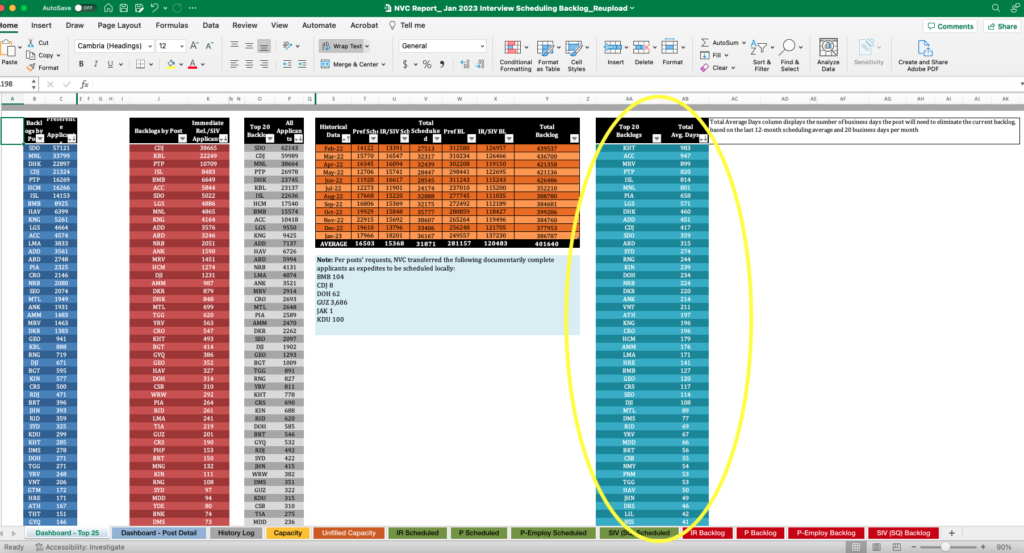Introduction
If you are an immigrant visa applicant who is waiting for an interview appointment at a U.S. consular office abroad, you might be wondering how long it will take for your case to be scheduled for interview. The answer depends on several factors, such as the availability of visa numbers, the capacity of the consular office, the demand for visa services, and the impact of external events like the COVID-19 pandemic.
One way to get an idea of the current situation is to look at the National Visa Center (NVC) Immigrant Visa Backlog Report, which is published monthly by the U.S. Department of State. The NVC is the agency that processes immigrant visa petitions after they are approved by the U.S. Citizenship and Immigration Services (USCIS) and before they are transferred to the consular office for interview. The NVC also collects the required documents and fees from the applicants and determines if they are ready for interview.
NVC Immigrant Visa Backlog Report Interpretation and limitations
The NVC Immigrant Visa Backlog Report provides data on the number of applicants who are documentarily complete and ready for interview, the number of applicants who have been scheduled for interview in the current month, and the number of applicants who are still pending the scheduling of an interview after the current month’s appointment scheduling was completed. The report also shows the estimated number of business days that each consular office will need to clear its backlog based on its performance over the previous 12 months.
The report is a snapshot in time and does not reflect the actual wait time for an individual applicant, as it does not account for cases that have already been transferred to the consular office, cases that are not documentarily complete, or cases that may skip the queue due to special circumstances. However, it does give a general sense of the magnitude and distribution of the backlog across different consular offices and regions.
Due to the COVID-19 pandemic and other factors, the NVC has faced significant challenges in scheduling interviews for all eligible applicants in a timely manner. According to the latest NVC Immigrant Visa Backlog Report published in August 2023, there were 378,475 applicants who were documentarily complete and ready for interview as of July 2023. Out of these, 39,394 applicants were scheduled for interview in August 2023, leaving 339,081 applicants still pending the scheduling of an interview after August 2023 appointment scheduling was completed. This means that on average, only about 10% of the ready applicants were scheduled for an interview each month.
To put this number in perspective, in Calendar Year 2019 on average, 60,866 applicants were pending the scheduling of an interview each month. This shows that the current backlog is more than five times higher than the pre-pandemic level. The NVC Immigrant Visa Backlog Report is updated monthly and can be accessed at https://travel.state.gov/content/travel/en/us-visas/visa-information-resources/visas-backlog.html.
Interpretation of Detailed NVC Immigrant Visa Backlog Report by IRAP
Another useful resource for applicants who want to learn more about the visa interview backlogs at consular offices around the world is a report published by the International Refugee Assistance Project (IRAP) in August 11, 2023. on its website at https://refugeerights.org/news-resources/nvcs-interview-scheduling-backlog-report-disclosed-a-way-to-learn-about-visa-interview-backlogs-at-consular-offices-around-the-world
The report reveals that some consular offices have much longer backlogs than others. It also shows the top 20 most backlogged offices as of August 2023, along with their estimated number of business days to clear their backlog based on their performance over the previous 12 months. It can clearly be seen that some offices would take more than two years to clear their backlog at their current capacity, assuming no new cases are added. For instance, the most backlogged office is Khartoum, which would take almost four years to clear its backlog. However, Khartoum is now indefinitely closed due to security reasons, which means that its applicants will have to be transferred to other offices or wait until it reopens.
The report also shows that some regions are more affected by the backlog than others. Out of the top 20 most backlogged offices, seven are located in Africa, six are in Asia, four are in Latin America and Caribbean, two are in Europe and one is in Middle East. This suggests that immigrant visa applicants from Africa and Asia face longer wait times than those from other regions.
Factors influencing NVC Interview Scheduling Backlog
The IRAP report provides some explanations for why some consular posts have higher backlogs than others. These include factors such as local COVID-19 conditions and restrictions, staffing levels and availability, physical space limitations, security concerns, and visa reciprocity issues.
The IRAP report is a valuable tool for applicants who want to understand how their consular post is handling the interview scheduling process and what factors may affect their wait time. However, it is important to note that this report is based on data up to January 2023 and may not reflect the current and future situations at each consular post. Moreover, the report is not widely publicized or easily accessible on the State Department website. Applicants should always check the website of their consular post for the most updated information and guidance.
Conclusion
The NVC interview scheduling backlog affects many immigrant visa applicants and their families. It is caused by multiple factors that may be beyond the control of the applicants and the NVC. However, there are some resources available for applicants who want to monitor the progress of their cases and to estimate their wait time. These include the easily accessible NVC monthly Immigrant Visa Backlog Report and the classified detailed version of the report that was published by IRAP, which provide useful data and analysis on the backlog situation by consular post. Applicants are encouraged to stay in touch with their immigration attorneys and follow the instructions from the NVC and their consular post to ensure that they are prepared for their interviews when they are scheduled. Being fully prepared will not only speed up the interview, but also help the State Department more efficiently reduce the number of those waiting for an interview appointment.
Resources:
1: National Visa Center (NVC) Immigrant Visa Backlog Report, U.S. Department of State, August 2023.
2: NVC’s Interview Scheduling Backlog Report Disclosed: A Way to Learn About Visa Interview Backlogs at Consular Offices Around the World, International Refugee Assistance Project, August 11, 2023
This article is provided for information purposes. Should you have any questions or be interested to learn more about this topic, contact Immigration Attorney Claudine Umuhire Gasana at [email protected] or call us at 281-809-5599.

